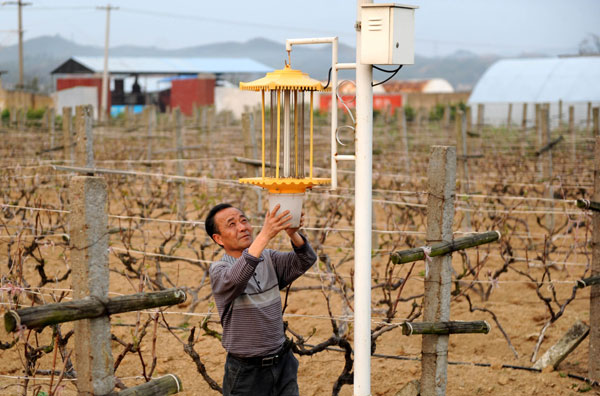Asian carbon tax debate set to warm up
Updated: 2012-06-15 08:09
By Karl Wilson (China Daily)
|
||||||||
Countries in the region examine ways to lead a greener lifestyle, reports Karl Wilson in Sydney.
The carbon tax has become one of the most politically divisive and bitterly fought tax reforms of this century and governments around the world, and in particular Asia, are debating the issue.
In an attempt to cut carbon emissions and reduce the effects of global warming, many countries are implementing green growth policies and introducing reforms to reduce dependence on fossil fuels.
|
 |
| Zeng Jiquan, a vegetable expert in Ganxian county, Jiangxi province, has helped local farmers to kill insects with solar-powered device instead of using pesticides. Zhou Ke / Xinhua |
On July 1, Australia will introduce a carbon tax. India already has a nationwide carbon tax of 50 rupees (90 US cents) per metric ton on coal.
Since the devastating earthquake and tsunami that hit Japan in March 2011 and the subsequent environmental disaster at the Fukushima nuclear power plant, Tokyo has been reassessing its entire energy policy.
South Korea has made low carbon, green growth a national priority while countries such as Malaysia, Singapore, Vietnam and Thailand are all pursuing their own policy objectives.
A new report by the United Nations Economic and Social Commission (ESCAP) for Asia and the Pacific is recommending that developing Asia-Pacific countries introduce a $10 a ton carbon dioxide tax on major greenhouse emission polluters, such as coal-fired power stations.
It is expected that many governments will wait and see what impact Australia's carbon tax has before making any firm decision.
The controversial tax has divided Australia since its proposal. When it comes into effect next month, around 500 of the country's biggest emitters of carbon pollution (carbon dioxide, methane, nitrous oxide and fluorocarbons from aluminum smelting) will be required to pay, via a permit system, a tax of A$23 ($22.60) on every ton of carbon dioxide released into the atmosphere.
The tax is believed to be the highest in the world - much higher than Europe, where it ranges from $8.70 to $12.60, according to a BBC report.
Industries that will be most affected by the Australian tax include electricity generation, stationary energy production, mining, business transport, waste and industrial processing.
Increasing power bills
Australia's federal opposition leader, Tony Abbott, has said repeatedly that the tax will increase consumers' power bills and cost jobs, especially in the coal mining and electricity industries.
Abbot has called the tax "economic madness" and has vowed to repeal the legislation if elected in polls due next year.
"It's a tax increase pretending to be an environmental policy," he said.

 Relief reaches isolated village
Relief reaches isolated village
 Rainfall poses new threats to quake-hit region
Rainfall poses new threats to quake-hit region
 Funerals begin for Boston bombing victims
Funerals begin for Boston bombing victims
 Quake takeaway from China's Air Force
Quake takeaway from China's Air Force
 Obama celebrates young inventors at science fair
Obama celebrates young inventors at science fair
 Earth Day marked around the world
Earth Day marked around the world
 Volunteer team helping students find sense of normalcy
Volunteer team helping students find sense of normalcy
 Ethnic groups quick to join rescue efforts
Ethnic groups quick to join rescue efforts
Most Viewed
Editor's Picks

|

|

|

|

|

|
Today's Top News
Health new priority for quake zone
Xi meets US top military officer
Japan's boats driven out of Diaoyu
China mulls online shopping legislation
Bird flu death toll rises to 22
Putin appoints new ambassador to China
Japanese ships blocked from Diaoyu Islands
Inspired by Guan, more Chinese pick up golf
US Weekly

|

|






